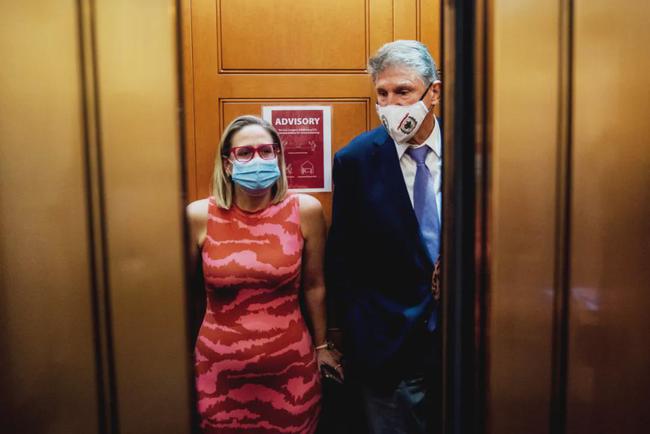Nearly a year after Biden defeated Trump by a narrow margin, the United States is still on the cutting edge. Many political results are possible. These include the gradual economic and political reforms that Biden is seeking, as well as the subversion of election and constitutional rules that Trump tried in January 2020 and that he and the Republican Party are still trying to reach.
It is difficult to determine exactly what has bothered the United States so deeply that triggered the Trump movement. Was it the endless cultural war that divided the United States because of race, religion, and ideology? Is wealth and power inequality increasing to unprecedented levels? Has the US's global power weakened with the rise of China, or has the continuous disasters brought about by the US-led war caused its pain, frustration, and confusion?
All these factors play a role in the turbulent politics of the United States. However, in my opinion, the most serious crisis is political-the US political system has failed to "promote the welfare of the general public" as promised by the US Constitution. In the past 40 years, American politics has become an insider's game, fattening the super-rich and corporate lobby groups at the expense of the interests of the vast majority of citizens.
Warren Buffett saw the nature of this crisis in 2006. "There is a class struggle, yes," he said, "but it is my class, the rich class, who started the war, and we are winning."
The main battlefield is in Washington. The Commandos are corporate lobbyists gathered in the U.S. Congress, federal departments, and administrative agencies. Ammunition is billions of dollars spent annually on federal lobbying (estimated at $3.5 billion in 2020) and campaign contributions (estimated at $14.4 billion in federal elections in 2020). The propagandists supporting class wars are corporate media led by billionaire Rupert Murdoch.
Nearly 2500 years ago, Aristotle famously said: A defective constitutional order may turn a good government into a bad government. A republic governed by the rule of law may be reduced to a populist mob rule, or an oligarchy ruled by a small number of corrupt classes or a tyranny of a single husband. Unless the U.S. political system can escape the corruption of large-scale corporate lobbying and campaign financing of the rich, the U.S. may face such disasters.
The American class war against the poor is nothing new. It started in the early 1970s and has been implemented with brutal efficiency in the past 40 years. From the inauguration of President Roosevelt in 1933 during the Great Depression to the Kennedy Johnson period from 1961 to 1968, the United States developed roughly the same path as Western Europe after the war, becoming a social-democratic country. . Income inequality is decreasing, and more social groups, especially African Americans and women, are joining the mainstream of economic and political life.
Then came the revenge of the rich. In 1971, corporate lawyer Lewis Powell (Lewis Powell) proposed a strategy to reverse the trend of social democracy, which is moving towards strengthening environmental supervision, workers' rights and fair taxation. Big companies are going to fight back. In 1971, President Richard Nixon nominated Powell as Justice of the Supreme Court of the United States. He was sworn in early the following year, which enabled him to implement his plan.
Under Powell's impetus, the Supreme Court opened the floodgates for corporate funds to enter the political arena. In the 1976 Buckley v. Valeo case, the Supreme Court lifted the federal government’s restrictions on campaign spending by candidates and independent groups, arguing that it violated freedom of speech. In the case of First National Bank of Boston v. Belotti in 1978, Powell wrote a majority opinion stating that the expenditure of enterprises for political propaganda belongs to freedom of speech and should not be subject to expenditure restrictions. The Supreme Court’s fierce attack on campaign funding restrictions culminated in the 2010 Citizens United v. Federal Election Commission (Citizens United v. Federal Election Commission) case, which ended all restrictions on corporate spending in federal politics .
After Reagan was elected president in 1981, he strengthened the Supreme Court’s crackdown on public welfare by cutting taxes for the rich, launching attacks on labor organizations, and cutting environmental protection. This trajectory has not been reversed.
As a result, the United States parted ways with Europe in terms of basically good economic performance, welfare, and environmental control. Europe as a whole continues to be on the road of social democracy and sustainable development, while the United States is on a road full of political corruption, oligarchy, the disparity between the rich and the poor, contempt for the environment, and refusal to restrict man-made climate change.
Some figures illustrate the difference. The fiscal revenue of the EU government accounts for about 45% of GDP on average, while the fiscal revenue of the US government only accounts for about 31% of GDP. Therefore, European governments can pay for universal healthcare, higher education, family support, and vocational training, while the United States cannot guarantee the provision of these services. Europe ranks at the top of the "World Happiness Report" life satisfaction rankings, while the United States ranks only 19th. In 2019, the European Union’s life expectancy was 81.1 years, while the United States life expectancy was 78.8 years (in 1980, the United States life expectancy was higher than that of the European Union). As of 2019, the wealthiest 1% of households in Western Europe accounted for approximately 11% of national income, compared with 18.8% in the United States. In 2019, the average American emitted 16.1 tons of carbon dioxide, compared with 8.3 tons in the European Union.
In short, the United States has become a country owned by the rich, governed by the rich, and enjoyed by the rich, and assumes no political responsibility for the climate damage it causes to other parts of the world. The resulting social fragmentation has led to desperate deaths (including drug overdose and suicide), reduced life expectancy (even before the new crown epidemic), and an increase in the incidence of depression, especially among young people. Politically, this chaos led to different directions-the most ominous direction is Trump, who proposed false populism and personality cult. Serving the rich while distracting the poor with xenophobia, culture wars, and strongman gestures may be the oldest trick in the instigator's script, but its effect is still shocking.
Strong Resistance
This is the situation Biden is trying to solve, but so far, his success has been limited and fragile. The simple fact is that all Republicans in Congress and a few but decisive Democrats intend to prevent any tax increases necessary for the rich and American companies, thereby preventing the establishment of a fairer and more environmentally friendly society. The establishment urgently needs an increase in federal revenue. They also hinder decisive action on climate change.
On September 30, 2021, US Senator Kyrsten Sinema (Kyrsten Sinema, left) and Joe Manchin (Joe Manchin) met in private for half an hour before going to the Senate to vote.
Therefore, at the end of the first year of Biden's tenure, the rich are still firmly in power, and face obstacles everywhere in terms of fair taxation, increased social spending, protection of voting rights, and urgently needed environmental protection. It is still possible for Biden to achieve some small victories and then make persistent efforts in the next few years. This is what the public wants. About two-thirds of Americans support tax increases for the rich and companies.
However, Biden’s setback in 2021 is likely to help the Republican Party win control of both houses of Congress in 2022. This will make it impossible to achieve legislative reforms until at least 2025, and may even herald Trump's return to power in the 2024 presidential election, which will be amid social chaos, violence, media propaganda, and voter suppression in Republican-controlled states. conduct.
The turmoil in the United States has disturbing international effects. When the United States cannot even manage itself coherently, it cannot lead global reforms. Perhaps the only thing that can unite Americans now is an excessively tense awareness of overseas threats. In the domestic chaos in the United States, politicians from both parties have escalated their anti-China rhetoric, as if the new Cold War could more or less ease the domestic anxiety in the United States. Alas, the belligerence between the two parties in Washington will only bring more global tensions and new dangers of conflict, rather than a real solution to security or any pressing global issues.
The United States has not yet returned, at least not. It is still struggling to overcome decades of political corruption and social neglect. The results are still highly uncertain, and the prospects for the next few years are fraught with dangers for the United States and the world.







































